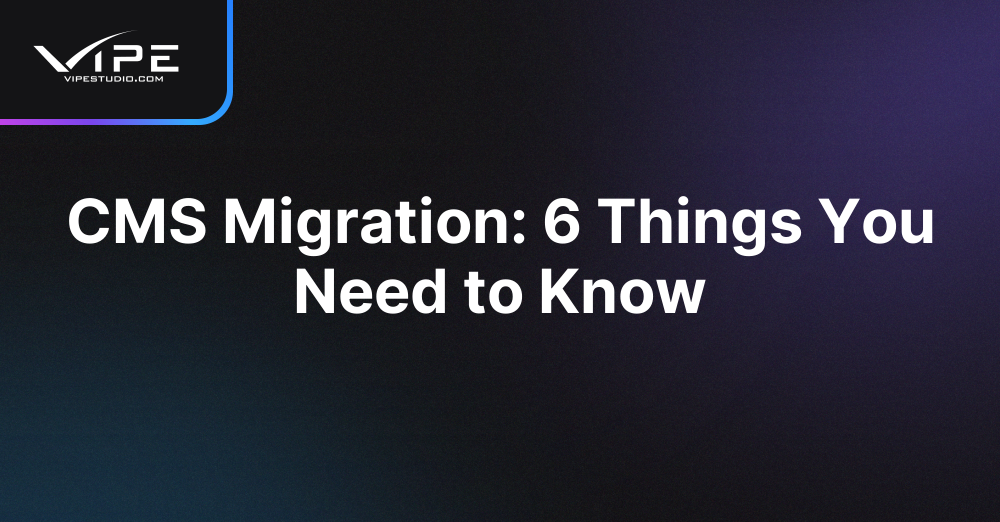20.08.2023
WordPress Development
CMS Migration: 6 Things You Need to Know
READING TIME: MIN
Table of Content
Migrating to a new CMS may be a tedious work for many website owners. Many of our clients from our enterprise WordPress agency for custom development also want to learn about several things that they need to know before they start migrating their websites. In this article, our professional WordPress editors from our enterprise WordPress agency for custom development would like to share some tips that you can follow easily. You might want to consider migrating your CMS website if you have any of these issues, such as speed issues, a high amount of website downtime, lack of support from your current platform, limited handling of large traffic, etc.
Backup Process: Safeguard Your Data
One of the first steps before initiating a CMS migration is to back up all your existing data. This process involves creating a copy of your website’s content, media files, databases, and configurations. A reliable backup ensures that you can restore your old CMS if any issues arise during the migration process. Backup your data to a secure location, either on an external server or cloud storage, to prevent data loss and provide peace of mind.
Familiarize Yourself with New Website Structure and SEO Aspects
The new CMS may have a different website structure and organization compared to your old one. Take the time to understand the new CMS’s features, user interface, and content organization. Ensure that your website’s structure remains intuitive and user-friendly for visitors. If you ask our SEO experts from our enterprise WordPress agency for custom development, we believe that It is crucial to maintain or improve your website’s search engine optimization (SEO) during migration. Identify key SEO elements such as page URLs, meta tags, and keyword usage in your new CMS. Redirect old URLs to their corresponding new ones to retain SEO value and avoid broken links.
Integrate Necessary Plugins and Codes
Every CMS has its own ecosystem of plugins and extensions. Determine which plugins you need to recreate the functionalities you had on the old CMS. Additionally, if you had custom code on your previous website, ensure that it is compatible with the new CMS or make the necessary adjustments for seamless integration. Before installing any plugins or code, verify their compatibility and reliability to prevent potential security vulnerabilities and conflicts. Our professional website experts from our enterprise WordPress agency for custom development can always help you find the right plugins or codes for your website.
Prioritize Security on Your New CMS Website
Security should be a top priority when migrating your CMS website. The new platform must offer robust security features and be regularly updated to protect against potential threats. Consider implementing SSL certificates, two-factor authentication, and secure user permissions to safeguard sensitive data. Before making your website live, conduct a thorough security audit to identify and address any potential vulnerabilities. Regularly monitor your website’s security post-migration to ensure continuous protection.
Audit Your Website Before Launch
Before launching your migrated website, conduct a comprehensive audit to verify that all content, media, and functionalities are working correctly. Test the website on various devices and browsers to ensure responsiveness and consistent user experience. Address any issues or inconsistencies found during the audit to provide visitors with a seamless browsing experience. If you need a professional audit service, you can always call our enterprise WordPress agency for custom development now. We have professional auditors who are ready to help you optimize your new website.
Optimize Overall Performance
A slow website can drive away visitors and impact SEO rankings negatively. Optimize your new CMS website’s performance by optimizing images, using browser caching, and also minimizing server requests. Regularly review and optimize your website’s codebase and database to improve loading times and overall user experience. Based on our experience with all of our customers from our enterprise WordPress agency for custom development, we find out that optimized website tend to be successful in attracting clients’ attention.
Those are several things that you need to know when you want to migrate your CMS website. We also have migration service that we can provide for our customers from our enterprise WordPress agency for custom development. This migration service will help you save a lot of your time and money when you want to migrate your website to a new CMS.
More on The Topic
- Leveraging WordPress REST API: Transforming Data Handling
- Navigating WooCommerce Performance: Real-World Strategies
- The Role of AI in WordPress Development Workflows
- Optimizing WordPress for Enterprise: Beyond Basic Caching
- WordPress and Headless Commerce: A Provocative Dilemma
The content of this website is copyrighted and protected by Creative Commons 4.0.



